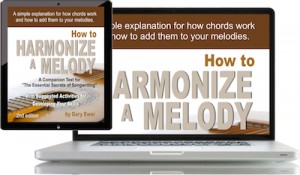 “The Essential Secrets of Songwriting 10-eBook Bundle” covers every aspect of how to write great songs. Contains a Study Guide that keeps you focused on becoming a consistently better songwriter. Get today’s FREE DEAL when you make your purchase. Click below for details.
“The Essential Secrets of Songwriting 10-eBook Bundle” covers every aspect of how to write great songs. Contains a Study Guide that keeps you focused on becoming a consistently better songwriter. Get today’s FREE DEAL when you make your purchase. Click below for details.
Here’s the scenario: You’ve just written a song, but you know that it’s not quite there yet. You know that you’ve got to make some changes, to tighten it up and make it better. So you sit down to play and sing it through with the intention of making little changes that will improve it.
What you want to avoid is the painful circumstance of having your song sound worse after spending hours editing and changing it. If your song keeps sounding worse with each change you make, it means that you’re not really sure what the final version should sound like.
I’ve been writing music for more than forty years, mostly for orchestras, concert bands and choirs, but who or what you’re writing for doesn’t really matter when it comes to the techniques involved in good editing.
I suppose I have dozens of ideas of what can be done to make music better (and those ideas are what this blog has been about.) But here are five editing tips that I’d put at the top of that list of ideas, tips I’ve followed over the years which I think will help you speed up the time it takes to polish a song and make it more likely that your song will be better in the end:
- Don’t fall so hopelessly in love with your song that you can’t bring yourself to changing bits that really should be changed. Be open minded and flexible.
- Editing that results in shortening a song (or part of a song) is almost always better than editing that results in lengthening a song (or part of a song).
- You’ll be surprised by how effective it can be to consider changing the tempo of a song. You’ll often pick up more nuances in the mood, and that can lead to other interesting changes.
- Develop an ability to listen to your song objectively, as if someone else wrote it. With objective listening, you have a better chance of hearing the way your potential audience will hear it.
- Second ideas are almost always better than first ideas. In other words, if a solution to a problem spot comes to you immediately, keep experimenting: you may just be on the verge of discovering even better solutions.
 Written by Gary Ewer. Follow on Twitter.
Written by Gary Ewer. Follow on Twitter.
 Have a great melody, but stuck at the “how to add chords to it” stage? “How To Harmonize a Melody” shows you, step-by-step and with sound samples, how it’s done, with suggestions for chord substitutions that might work as well. It’s part of “The Essential Secrets of Songwriting” 10-eBook Bundle.
Have a great melody, but stuck at the “how to add chords to it” stage? “How To Harmonize a Melody” shows you, step-by-step and with sound samples, how it’s done, with suggestions for chord substitutions that might work as well. It’s part of “The Essential Secrets of Songwriting” 10-eBook Bundle.










